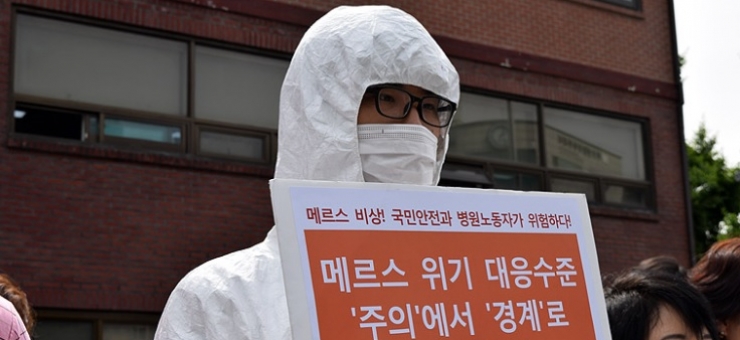Korean union KHMU urges government action on MERS

Yoo Ji-Hyun, President of Korean union the KHMU, has held a press conference in Seoul to urge the government to form a pan-government taskforce under the direction of the Presidential Office. Yoo Ji-Hyan also requested the government to designate the viral disease as a national disaster; to take actions corresponding to its urgency and seriousness with tertiary infection being considered beyond secondarily infection; and to raise the level of national epidemic crisis to ‘warning’ from ‘caution’.
The KHMU has itself set up a MERS response team and investigated the real situation regarding MERS. The union's research revealed that medical institutions currently treating MERS patients are in extremely poor condition. As of May 31, four confirmed patients out of 18 (22.2%) were found to be doctors and nurses who had treated patients with the respiratory virus.
The government stated that it had designated hospitals which would specialise in treating MERS patients in order to more efficiently control treatment and spread prevention. The manuals about MERS treatment, however, are not fully shared among healthcare service providers and medical staff have yet to be properly trained, which leads them to be exposed to a higher risk without any preventive preparation. Worse more, only 105 beds nationwide are placed in rooms equipped with low atmospheric pressure facilities. These are shared rooms and so the 105 beds cannot be fully utilized by MERS patients because of infection risk.
The number of healthcare experts dedicated to patients with MERS is insufficient. For instance, at a medical center where five confirmed patients are hospitalized had to close five intensive care units and two wards in order to treat MERS patients, while deploying 30 nurses for MERS treatment alone. A total of 17 doctors in the centre are treating patients, and they are suffering severe fatigue as there are no doctors to cover staff who need rest or leave.
The KHMU has urged the government to disclose if the nation is fully ready to prevent and cure the new infectious disease and equipped with sufficient number of proper infrastructure both in terms of human and physical resources. It has also requested the government to reveal the full picture as regards the level of preparedness of the 17 hospitals and 211 public healthcare facilities designated to deal with the crisis.
This crisis highlights the problems with an under resourced and commercialised system of health provision.
For more information, see http://bogun.nodong.org/english/

